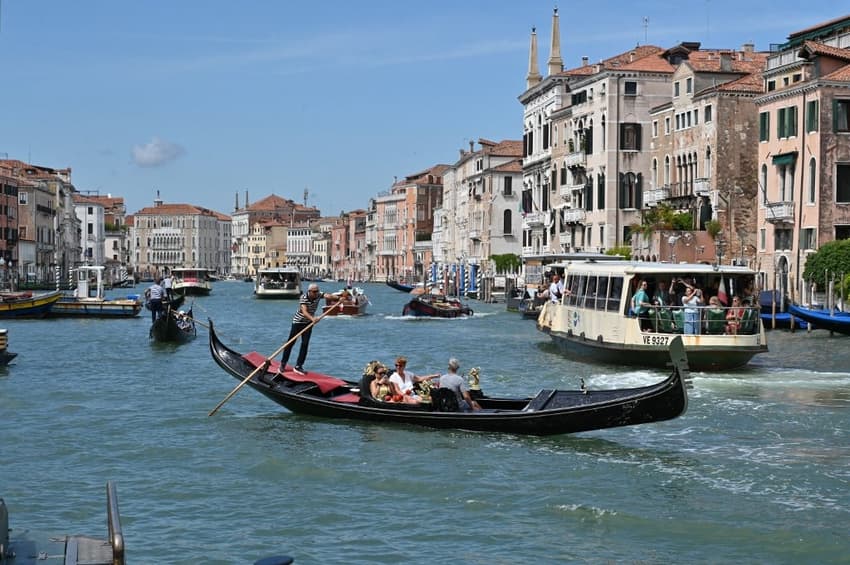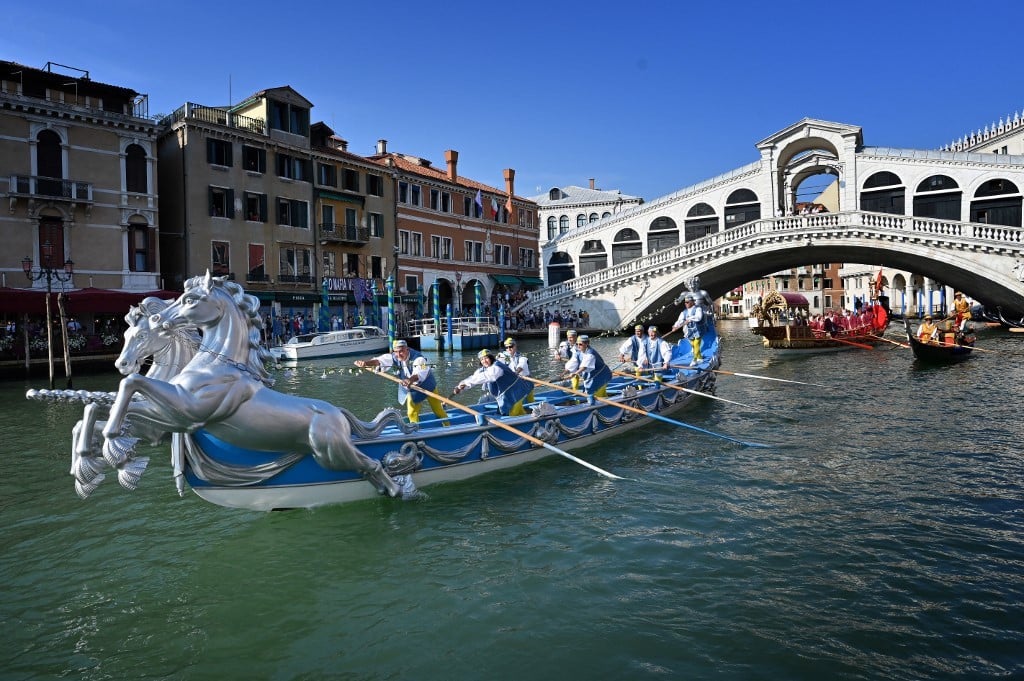Seven Venetian words that are used in English

From ‘arsenal’ to ‘pants’, it's surprising how many commonly-used English words originally came from Venice's local dialect.
If you’ve been fortunate enough to live in or just visit Italy, chances are you’ve explored Venice. The canalled city famed for the Rialto Bridge, St Mark’s Square, and Doge’s Palace attracts millions of tourists each year (vastly outnumbering the city centre's 50,000 residents). In fact, recent figures show there are 21 tourists per resident.
However, La Serenissima is much more than just tourist attractions; it’s made a mark in the linguistic world too. The Venetian language itself, though usually referred to as a dialect (dialetto), derives from Vulgar Latin, and is a sister language of today's Italian (which by the way was not officially declared the national language of Italy until October 1925, under fascist rule.)
IN MAPS: A brief introduction to Italy's many local dialects
Before that, Italians predominantly spoke in their regional dialects even after Garibaldi unified Italy in 1864.
Before that period, Venice was the main seat of the Republic of Venice (7th century - 1797) which spanned all the way to Crete. Venetian was even considered a lingua franca of the Mediterranean. It may be odd to think of Marco Polo, the famously Italian explorer, speaking in Venetian and not Italian.
This goes some way to explaining how the Venetian language travelled far and wide, with many terms from this beautiful nook in the Northeast of Italy found in our English dictionaries today.
Gazette
There are two theories to this. The first is that the word gazette, or the Italian gazzetta, was the name given to informal news and gossip papers initially published in Venice around the mid-16th century. The second is that the coins used to pay for the papers were called gaxeta and this led to the paper’s name.
READ ALSO: Why are Italy's disappearing dialects so important?
Whatever the theory, the word gazette soon started to make an appearance in France and England. One of these, The Gazette (formerly known as Oxford Gazette and then London Gazette) has been around since 1665 and is said to be England’s first true newspaper.
Arsenal
The Venetian Arsenal (Italian arsenale) was a complex of laboratories, workshops and shipyards. The word spread due to the fame of the Venetian Arsenal in the late 16th century. Nowadays you're more than likely to associate it with a certain football club or with a place to store weapons. It’s also true that the Arabic language had a part to play in this with dār al-ṣināʿa meaning ‘factory’.
Regatta
This word sounds very Italian, doesn’t it? The term regata first appeared in the 13th century and was represented in the 1500s by Venetian painter Jacobo de’ Barbari in his painting of what we can recognise as a regatta, or boat race.
Though regattas are a huge part of Venetian culture, the principal Regata Storica took its name in 1899. There are now lots of regattas around the globe with the Henley Royal Regatta perhaps being the most prestigious.

Venice's Historical Regatta. Photo by Alberto PIZZOLI / AFP.
Pants
The history of this word is a very amusing one. It doesn’t come from someone naming trousers, but rather a character named Pantalone from the Commedia dell’Arte, a form of comic Italian theatre popular throughout Europe between the 16th and 18th centuries. Pantalone himself was fictionalised as being from Venice and he wore, you guessed it, long trousers.
Trousers of a similar style became known as pantaloons during England’s Restoration Period and now British people might think of them as underwear or underpants. Americans on the other hand have kept Pantalone’s 'pants'.
Ballot
This derives from the word ballota, which was a ball used in elections in Venice to choose a Doge (the sovereign of the state) The balls were either gold or silver and were drawn by senators. In Italian it’s called a ballottaggio and in French a ballotage, showing how far this word has spread.
Ghetto
Whilst this isn’t a particularly pleasant word to include, it’s important to do so. In the early 1500s, Venice’s Jewish population was forced to move to a small part of the city where there was a foundry or geto.
A lot of Jews in Venice originated from central Europe and pronounced the ‘g’ in ‘geto’ similarly to the hard ‘g’ in ‘game; as opposed to the soft g in ‘gin’. This is where today's meaning and pronunciation of the word ghetto comes from.
Quarantine
This word was everywhere not too long ago. The word quarantine or quarantena was first coined in Venice when it was grappling with the bubonic plague.
Quaranta means forty and anyone suspected of coming into contact with those infected were required to isolate for forty days. Not that it made much difference to the poor people of that time - thousands of people in the city died.
A bonus word…
There is one more word that isn’t strictly English, but it is used by English speakers as a loan word frequently (it is in the Oxford Dictionary after all).
That word is ciao. Like all the other words above, it initially comes from Venetian and is today understood and used jokingly in English-speaking countries as an informal greeting. Its root term s’ciavo was used by slaves to salute their Venetian masters. By saying this, they meant ‘I am your slave’. Fortunately, nowadays, the word is used in a much friendlier context.
Comments
See Also
If you’ve been fortunate enough to live in or just visit Italy, chances are you’ve explored Venice. The canalled city famed for the Rialto Bridge, St Mark’s Square, and Doge’s Palace attracts millions of tourists each year (vastly outnumbering the city centre's 50,000 residents). In fact, recent figures show there are 21 tourists per resident.
However, La Serenissima is much more than just tourist attractions; it’s made a mark in the linguistic world too. The Venetian language itself, though usually referred to as a dialect (dialetto), derives from Vulgar Latin, and is a sister language of today's Italian (which by the way was not officially declared the national language of Italy until October 1925, under fascist rule.)
IN MAPS: A brief introduction to Italy's many local dialects
Before that, Italians predominantly spoke in their regional dialects even after Garibaldi unified Italy in 1864.
Before that period, Venice was the main seat of the Republic of Venice (7th century - 1797) which spanned all the way to Crete. Venetian was even considered a lingua franca of the Mediterranean. It may be odd to think of Marco Polo, the famously Italian explorer, speaking in Venetian and not Italian.
This goes some way to explaining how the Venetian language travelled far and wide, with many terms from this beautiful nook in the Northeast of Italy found in our English dictionaries today.
Gazette
There are two theories to this. The first is that the word gazette, or the Italian gazzetta, was the name given to informal news and gossip papers initially published in Venice around the mid-16th century. The second is that the coins used to pay for the papers were called gaxeta and this led to the paper’s name.
READ ALSO: Why are Italy's disappearing dialects so important?
Whatever the theory, the word gazette soon started to make an appearance in France and England. One of these, The Gazette (formerly known as Oxford Gazette and then London Gazette) has been around since 1665 and is said to be England’s first true newspaper.
Arsenal
The Venetian Arsenal (Italian arsenale) was a complex of laboratories, workshops and shipyards. The word spread due to the fame of the Venetian Arsenal in the late 16th century. Nowadays you're more than likely to associate it with a certain football club or with a place to store weapons. It’s also true that the Arabic language had a part to play in this with dār al-ṣināʿa meaning ‘factory’.
Regatta
This word sounds very Italian, doesn’t it? The term regata first appeared in the 13th century and was represented in the 1500s by Venetian painter Jacobo de’ Barbari in his painting of what we can recognise as a regatta, or boat race.
Though regattas are a huge part of Venetian culture, the principal Regata Storica took its name in 1899. There are now lots of regattas around the globe with the Henley Royal Regatta perhaps being the most prestigious.

Pants
The history of this word is a very amusing one. It doesn’t come from someone naming trousers, but rather a character named Pantalone from the Commedia dell’Arte, a form of comic Italian theatre popular throughout Europe between the 16th and 18th centuries. Pantalone himself was fictionalised as being from Venice and he wore, you guessed it, long trousers.
Trousers of a similar style became known as pantaloons during England’s Restoration Period and now British people might think of them as underwear or underpants. Americans on the other hand have kept Pantalone’s 'pants'.
Ballot
This derives from the word ballota, which was a ball used in elections in Venice to choose a Doge (the sovereign of the state) The balls were either gold or silver and were drawn by senators. In Italian it’s called a ballottaggio and in French a ballotage, showing how far this word has spread.
Ghetto
Whilst this isn’t a particularly pleasant word to include, it’s important to do so. In the early 1500s, Venice’s Jewish population was forced to move to a small part of the city where there was a foundry or geto.
A lot of Jews in Venice originated from central Europe and pronounced the ‘g’ in ‘geto’ similarly to the hard ‘g’ in ‘game; as opposed to the soft g in ‘gin’. This is where today's meaning and pronunciation of the word ghetto comes from.
Quarantine
This word was everywhere not too long ago. The word quarantine or quarantena was first coined in Venice when it was grappling with the bubonic plague.
Quaranta means forty and anyone suspected of coming into contact with those infected were required to isolate for forty days. Not that it made much difference to the poor people of that time - thousands of people in the city died.
A bonus word…
There is one more word that isn’t strictly English, but it is used by English speakers as a loan word frequently (it is in the Oxford Dictionary after all).
That word is ciao. Like all the other words above, it initially comes from Venetian and is today understood and used jokingly in English-speaking countries as an informal greeting. Its root term s’ciavo was used by slaves to salute their Venetian masters. By saying this, they meant ‘I am your slave’. Fortunately, nowadays, the word is used in a much friendlier context.
Join the conversation in our comments section below. Share your own views and experience and if you have a question or suggestion for our journalists then email us at [email protected].
Please keep comments civil, constructive and on topic – and make sure to read our terms of use before getting involved.
Please log in here to leave a comment.